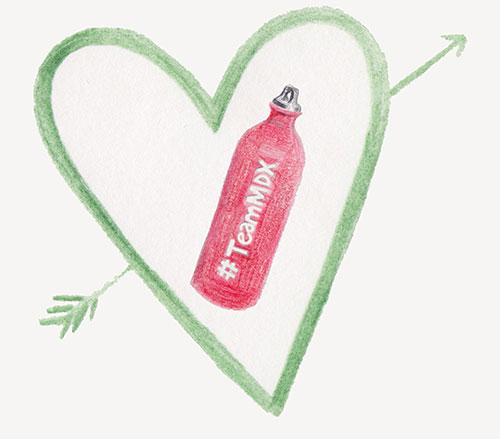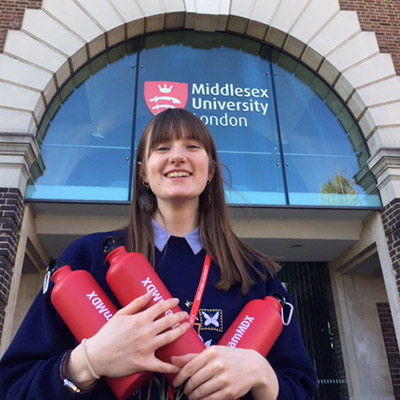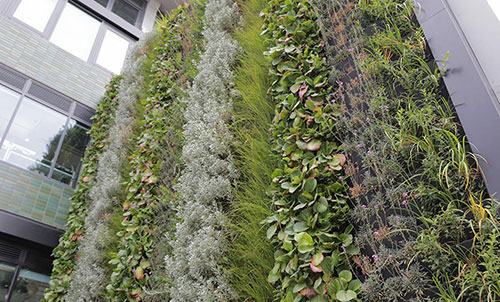Middlesex University is just one of thirty-six institutions in the UK to achieve an award from the People and Planet Green League for our environmental performance. But what actions are we really taking in our everyday lives on campus to deserve such an award? I’ve been investigating…
 |  |
|---|
The plastic crisis
We all know how big of an issue plastic pollution is so that’s why Middlesex’s Plastic Reduction campaign is working closely with Chartwells, our café contractors, to help shrink our campus’ plastic footprint.
We’ve ditched the disposable plastic cutlery for biodegradable wooden cutlery and the same with straws, you’ll now only get paper ones. We also sell Middlesex reusable mugs and bottles in our cafes and offer students 20p off their drinks when they use them. In our mission to reduce plastic we’ve installed three new water bottle refilling stations that have been used over 100,000 times since they were installed 7 months ago, saving huge amounts of plastic bottles from landfill or worse, the ocean.
A 2017 survey of 279 British beaches found that 73% of them had some number of plastic pellets on them, which will eventually break down into microplastics and are especially dangerous because of the chemicals in our waters that stick to them and spread, along with the microplastics, to fresh water.
Middlesex’s Pranav Tamhankar, currently working on a sample from a Southend-on-Sea beach, is doing research on finding a speedy and effective way of detecting and extracting these microplastics from their surroundings, making it easier to find what types of plastics mostly pollute the oceans to create tighter restrictions on them.
The overseer of the Environmental Health lab, Salma Conner, has been doing some amazing work to help reduce the lab’s plastic waste. After her revaluation of the lab’s personal protection equipment she has introduced cotton lab coats that are issued to each student at the start of the year, which they take home to wash after their lab sessions every Friday. Unnecessary plastic gloves and overshoes are also now only available upon request, so a huge amount of pointless plastic waste is eliminated thanks to this new system.
Renewable energy
The process of extracting fossil fuels is extremely damaging to the natural landscape and their burning creates a huge amount of carbon dioxide that accumulates in our atmosphere and traps rays from the sun and heating the planet. This process is commonly known as the greenhouse effect and plays a big part in global warming.
 |  |
|---|
We are also doing our part to reduce our consumption of these fossil fuels, Middlesex has 446 solar panels installed on five campus buildings that produce 65, 000 kilo watts of energy in a typical year and 109 meters monitoring energy consumption on campus every half an hour. We have also switched to LED lights on campus that use 10% of the energy incandescent bulb use. In line with the ethos of the NUS student switch off, we encourage students in our halls of residence to switch off their appliances wherever possible.
Printing
In the last forty years world consumption of paper has grown by nearly 400%. Now 35% of the total trees cut down around the world are used in the paper industries. That equates to about 2.47 million trees cut down every day.
At Middlesex we encourage students to think before they print or copy. Production of paper uses a huge amount of energy, water and chemicals and creates a huge amount of solid, liquid and gaseous waste. Our printers are not automatic and require log in, if a print job is not printed in 12 hours it is automatically deleted from the system and if a student decides they do not want to print what they have sent or have accidentally sent it twice they have the option to delete it from the system.
Water conservation
On the side of our campus’ Ritterman building is our living wall upon which grows more than 3,500 plants that help capture, store and recycle rain water. “Research has shown that green walls can reduce levels of the most harmful air pollutants, nitrogen dioxide (NO2) and particulate matter (PM10), levels of which are frequently exceeded in many parts of London and other cities”- Senior Lecturer in Bioscience and Biomedical Science at Middlesex, Dr Dirk Wildeboer. Additionally, we have two tanks on campus harvest over 24, 000 litres of rain water on average annually that we use to flush our toilets in the Sheppard library.
Make your mark on campus
If you are interested in sustainability at Middlesex and have a great new idea for campus, bids are now open for an incredible £1000 that has been raised from the 5p disposable cup charges at campus cafes.
Apply and find out more here